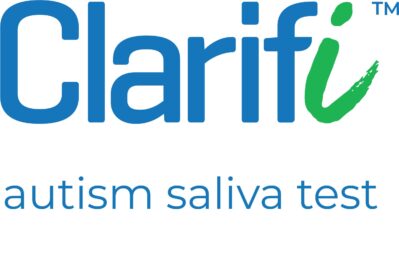Rising autism prevalence and longer wait times delay autism diagnosis
According to the CDC, 1 in 36 children in the U.S. are diagnosed with autism spectrum disorder (ASD). Even though ASD can be clinically diagnosed as early as 16 months old, the average age of diagnosis is currently 4 years of age. A biological, diagnostic tool can further inform clinical judgment and substantially improve early identification.

Breakthroughs in epigenetic research identify biomarkers to aid in autism diagnosis
Clarifi ASD is a biological tool to aid in the diagnosis of autism based on epigenetics and the microbiome. Clarifi ASD is not a genetic test. It is the product of scientific advancements in the area of epigenetics; the factors that influence how genes are turned on and off. Our peer-reviewed research discovered that certain RNA molecules that regulate genetic activity and reflect interactions between a patient and their environment are different in children.
Published Research
Saliva biomarkers of GI dysfunction in children with autism, Frontiers in Psychiatry, January 2022
Read ArticleLongitudinal stability of salivary microRNA biomarkers in children and adolescents with autism spectrum disorder, Research in Autism Spectrum Disorder, April 2021
Read ArticleEvidence-based use of scalable biomarkers to increase diagnostic efficiency and decrease lifetime costs of autism, Autism Research INSAR, March 2021
Read ArticleOral microbiota and autism spectrum disorder (ASD), Journal of Oral Microbiology, December 2019
Read ArticleM14 - Combined analysis of the oral microbiome and microtranscriptome of autism spectrum disorder, Science Direct, March 2019
Read ArticleParent Perspectives Towards Genetic and Epigenetic Testing for Autism Spectrum Disorder, Journal of Autism and Developmental Disorders, March 2019
Read ArticleSaliva microRNA Differentiates Children With Autism From Peers with Typical and Atypical Development, JAACAP, March 2019
Read ArticleValidation of a Salivary RNA Test for Childhood Autism Spectrum Disorder, Frontiers in Genetics, November 2018
Read ArticleOral microbial activity may help identify autism in children, Healio Psychiatry, August 2018
Read ArticleDiurnal Oscillations in Human Salivary microRNA and Microbial Transcription: Implications for Human Health and Disease, PLOS One July 2018
Read ArticleA Comparative Review of microRNA Expression Patterns in Autism Spectrum Disorder, Frontiers in Psychiatry, November 2016
Read ArticleSalivary MiRNA Profiles Identify Children with Autism Spectrum Disorder, Correlate with Adaptive Behavior, and Implicate ASD Candidate Genes Involved in Neurodevelopment, BMC Pediatrics April 2016
Read ArticleThe Clarifi™ autism saliva test
Clarifi ASD is a simple saliva test that can be administered in the convenience of your home.
Simple
Non-invasive and easily administered at-home saliva test
Timely
Accelerates the diagnostic process with results in weeks opposed to months
Objective
Based on peer reviewed research and biology
Molecular
Measures epigenetic molecules in saliva
Stay updated on when Clarifi ASD becomes available
Clarifi ASD is a prescription-only autism diagnostic tool. At this time Clarifi ASD tests cannot be ordered. If you are a parent or provider interested in Clarifi ASD when it becomes available, please provide your information and we’ll send you updates as we get closer to product launch.
If you need additional information, please contact us at:
support@quadrantbiosiences.com
Thank you again for your patience and understanding.


